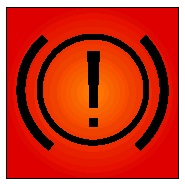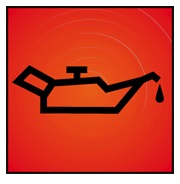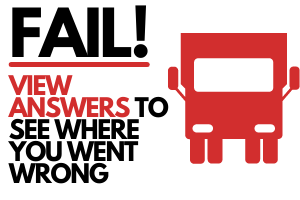Vehicle Condition
Vehicle Condition
Test Summary
0 of 84 questions complete.
Questions:
Information
You have already completed the %s. You can’t start it again.
Test is loading…
You must sign in or sign up to take this test.
You must first complete the following:
Results
Test complete. Results are being recorded.
Results
0 of 84 questions answered correctly.
Time has elapsed.
You have reached 0 of 0 point(s), (0)
Earned Points: of ()
Essay(s) Pending (Possible Points: )
Categories
- Not categorized 0%
- 1
- 2
- 3
- 4
- 5
- 6
- 7
- 8
- 9
- 10
- 11
- 12
- 13
- 14
- 15
- 16
- 17
- 18
- 19
- 20
- 21
- 22
- 23
- 24
- 25
- 26
- 27
- 28
- 29
- 30
- 31
- 32
- 33
- 34
- 35
- 36
- 37
- 38
- 39
- 40
- 41
- 42
- 43
- 44
- 45
- 46
- 47
- 48
- 49
- 50
- 51
- 52
- 53
- 54
- 55
- 56
- 57
- 58
- 59
- 60
- 61
- 62
- 63
- 64
- 65
- 66
- 67
- 68
- 69
- 70
- 71
- 72
- 73
- 74
- 75
- 76
- 77
- 78
- 79
- 80
- 81
- 82
- 83
- 84
- Current
- Review
- Answered
- Correct
- Incorrect
-
Question 1 of 841. Question
The bus you’re driving is fitted with automatic transmission. When would you use kickdown?
CorrectIncorrect -
Question 2 of 842. Question
Your coach is fully laden. What’s the most likely reason for the steering feeling heavy?
CorrectIncorrect -
Question 3 of 843. Question
Why are frequent tyre checks advisable on a tri-axle double-deck vehicle?
CorrectIncorrect -
Question 4 of 844. Question
You’re driving a three-axle double-deck bus. Why should you take extra care when using full steering lock?
CorrectIncorrect -
Question 5 of 845. Question
When should the driver of a coach wear gloves?
CorrectIncorrect -
Question 6 of 846. Question
You’re driving a three-axle double-deck bus and have the steering turned onto full lock. What should you do to avoid rear tyre scrub?
CorrectIncorrect -
Question 7 of 847. Question
You’re driving a six-wheeled double-deck bus. What do you need to know about punctures on the rear tyres?
CorrectIncorrect -
Question 8 of 848. Question
You’re driving a double-deck bus. What’s the minimum depth of tread required over three-quarters of each tyre’s width?
CorrectIncorrect -
Question 9 of 849. Question
What should you regularly check on the tyres of your bus?
CorrectIncorrect -
Question 10 of 8410. Question
What should you do if you notice that your coach’s right rear indicator isn’t working?
CorrectIncorrect -
Question 11 of 8411. Question
What will result from having over-inflated tyres?
CorrectIncorrect -
Question 12 of 8412. Question
Before each journey, you should check all warning lights. What should you do if a warning light remains lit?
CorrectIncorrect -
Question 13 of 8413. Question
What should you do before uncoupling your trailer?
CorrectIncorrect -
Question 14 of 8414. Question
Why should you check your tyres more frequently on a coach with three axles?
CorrectIncorrect -
Question 15 of 8415. Question
Some buses have different-sized wheels on the front and rear. What do you need to be aware of when driving at high speeds on long journeys?
CorrectIncorrect -
Question 16 of 8416. Question
How frequently should a driver carry out a walk-round check?
CorrectIncorrect -
Question 17 of 8417. Question
What should you do before stopping a turbocharged engine?
CorrectIncorrect -
Question 18 of 8418. Question
A passenger tells you they’ve noticed that a wheel nut is missing from your bus. How often should you check your vehicle’s wheel nuts?
CorrectIncorrect -
Question 19 of 8419. Question
What should you do when you park a vehicle that’s fitted with a turbocharger?
CorrectIncorrect -
Question 20 of 8420. Question
You’re driving at night on a very busy road when your headlights fail. What should you do if the fuse box is on the outside of the bus, on the right-hand side?
CorrectIncorrect -
Question 21 of 8421. Question
Your coach often tows a trailer. How often should you check the trailer tyres for pressure?
CorrectIncorrect -
Question 22 of 8422. Question
You’re checking your vehicle’s tyres before starting a long motorway journey. What check should be made on each tyre?
CorrectIncorrect -
Question 23 of 8423. Question
What should you do if you notice that two wheel nuts are missing from one of the wheels on your vehicle?
CorrectIncorrect -
Question 24 of 8424. Question
What would be illegal?
CorrectIncorrect -
Question 25 of 8425. Question
In very cold weather, moisture can freeze in your vehicle’s air storage tanks. What can you do to help prevent this from happening?
CorrectIncorrect -
Question 26 of 8426. Question
What does this warning light on the instrument panel mean?
 CorrectIncorrect
CorrectIncorrect -
Question 27 of 8427. Question
You’re driving along a motorway. What should you do if the air-pressure warning device starts to operate?
CorrectIncorrect -
Question 28 of 8428. Question
Your vehicle has broken down at night on a two-way road. How should you try to leave the vehicle?
CorrectIncorrect -
Question 29 of 8429. Question
What should you do if your power-assisted steering fails suddenly?
CorrectIncorrect -
Question 30 of 8430. Question
Your steering suddenly becomes heavy to turn. What could make this happen?
CorrectIncorrect -
Question 31 of 8431. Question
What should you do if the brake pedal becomes hard to press?
CorrectIncorrect -
Question 32 of 8432. Question
Why do air tanks on brake systems need to be drained?
CorrectIncorrect -
Question 33 of 8433. Question
You’re checking your vehicle. What should you do if you discover an air leak in the braking system?
CorrectIncorrect -
Question 34 of 8434. Question
A loud buzzer sounds in your vehicle. What’s this most likely to indicate?
CorrectIncorrect -
Question 35 of 8435. Question
What proportion of the width of a tyre must have at least the legal minimum depth of tread?
CorrectIncorrect -
Question 36 of 8436. Question
You discover that one of your rear brake-light bulbs has failed. How soon should it be replaced?
CorrectIncorrect -
Question 37 of 8437. Question
What can you add to diesel fuel to prevent it from becoming less effective at low temperatures?
CorrectIncorrect -
Question 38 of 8438. Question
You’re about to start a long journey midway through the day. What should you do if you notice that the sidelights work but the headlights are faulty?
CorrectIncorrect -
Question 39 of 8439. Question
Before starting a journey, you want to check your brake-system warning lights. What can you do when these aren’t operated by the ignition switch?
CorrectIncorrect -
Question 40 of 8440. Question
On motorways, you’re usually driving at higher speeds for long distances. What effect can this have on your tyres?
CorrectIncorrect -
Question 41 of 8441. Question
You notice that one of your tyres has a bulge in the side wall. What will happen if you drive the vehicle?
CorrectIncorrect -
Question 42 of 8442. Question
What’s the purpose of a preheating device?
CorrectIncorrect -
Question 43 of 8443. Question
Where does a high-pressure fuel injector deliver fuel?
CorrectIncorrect -
Question 44 of 8444. Question
Why is it important to avoid overfilling the engine with oil?
CorrectIncorrect -
Question 45 of 8445. Question
Why should you use an approved coolant solution in your engine’s cooling system?
CorrectIncorrect -
Question 46 of 8446. Question
What’s it advisable to do when you replace a tubeless tyre?
CorrectIncorrect -
Question 47 of 8447. Question
When should you check the oil level in your engine?
CorrectIncorrect -
Question 48 of 8448. Question
When should anti-freeze be used in the cooling system?
CorrectIncorrect -
Question 49 of 8449. Question
What does this warning light on the instrument panel mean?
 CorrectIncorrect
CorrectIncorrect -
Question 50 of 8450. Question
What does it mean if the ignition warning light comes on while you’re driving?
CorrectIncorrect -
Question 51 of 8451. Question
What do the codes shown on the side walls of lorry tyres refer to?
CorrectIncorrect -
Question 52 of 8452. Question
What will happen if you follow a regular vehicle maintenance schedule?
CorrectIncorrect -
Question 53 of 8453. Question
What should you do before changing a wheel on your vehicle?
CorrectIncorrect -
Question 54 of 8454. Question
You’ve had to change a wheel on your vehicle. When should the wheel nuts be checked again?
CorrectIncorrect -
Question 55 of 8455. Question
Why should your engine oil be changed at the recommended intervals?
CorrectIncorrect -
Question 56 of 8456. Question
Where should you park your vehicle before checking the engine oil level?
CorrectIncorrect -
Question 57 of 8457. Question
What could happen if you overfill your engine with oil?
CorrectIncorrect -
Question 58 of 8458. Question
You’ve stopped on a firm, level surface. What’s the first thing you must do before you uncouple the trailer?
CorrectIncorrect -
Question 59 of 8459. Question
When should you check the wheel nuts on your vehicle?
CorrectIncorrect -
Question 60 of 8460. Question
What should you do if thick black smoke is coming from the exhaust of your vehicle?
CorrectIncorrect -
Question 61 of 8461. Question
You hit the kerb at speed. What part of your vehicle should you check for damage?
CorrectIncorrect -
Question 62 of 8462. Question
When can ‘selective’ or ‘block’ gear changing be used?
CorrectIncorrect -
Question 63 of 8463. Question
When would you use ‘kickdown’ on a vehicle that has automatic transmission?
CorrectIncorrect -
Question 64 of 8464. Question
What’s the most likely cause if your steering starts to feel heavy?
CorrectIncorrect -
Question 65 of 8465. Question
Your vehicle suffers a tyre blow-out. How could this create a hazard for other road users?
CorrectIncorrect -
Question 66 of 8466. Question
The Driver and Vehicle Standards Agency (DVSA) and the police carry out spot checks for faulty vehicles. What will happen to the vehicle if serious defects are found?
CorrectIncorrect -
Question 67 of 8467. Question
At a Driver and Vehicle Standards Agency (DVSA) roadside check, your vehicle is found to have serious defects and you may no longer use it. Who will DVSA share this information with?
CorrectIncorrect -
Question 68 of 8468. Question
What could happen if there isn’t enough oil in your engine?
CorrectIncorrect -
Question 69 of 8469. Question
While driving, your engine-oil warning light comes on. Why could it be dangerous to continue driving?
CorrectIncorrect -
Question 70 of 8470. Question
Bus and lorry tyres have codes on their side walls. What do these codes refer to?
CorrectIncorrect -
Question 71 of 8471. Question
What’s the advantage of energy-saving tyres?
CorrectIncorrect -
Question 72 of 8472. Question
A tyre has been replaced on your vehicle. What precautions should be taken when tightening the wheel nuts?
CorrectIncorrect -
Question 73 of 8473. Question
Why are energy-saving tyres effective?
CorrectIncorrect -
Question 74 of 8474. Question
Where can you get advice to help carry out minor repairs?
CorrectIncorrect -
Question 75 of 8475. Question
Where can you get advice about carrying out repairs to your vehicle?
CorrectIncorrect -
Question 76 of 8476. Question
What could happen if you overfill your engine with oil?
CorrectIncorrect -
Question 77 of 8477. Question
What’s the purpose of the oil filter?
CorrectIncorrect -
Question 78 of 8478. Question
Which tool is essential for fitting a road wheel?
CorrectIncorrect -
Question 79 of 8479. Question
What’s the most likely reason for a diesel-engined vehicle running erratically in very cold weather?
CorrectIncorrect -
Question 80 of 8480. Question
What do heated fuel lines prevent?
CorrectIncorrect -
Question 81 of 8481. Question
Why should you carry out a daily walk-round check before setting off?
CorrectIncorrect -
Question 82 of 8482. Question
What happens to diesel fuel when it gets hot?
CorrectIncorrect -
Question 83 of 8483. Question
What must vehicle operators provide for their drivers?
CorrectIncorrect -
Question 84 of 8484. Question
You’re uncoupling a trailer. What must you do before disconnecting any of the air lines?
CorrectIncorrect


